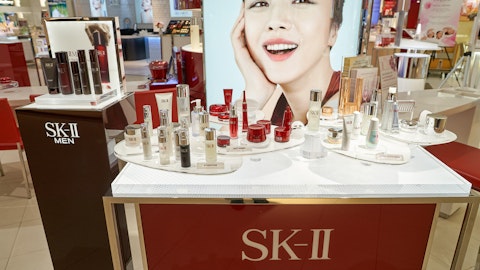Shakil Lakhani : Yes, Dan, good question. I think it’s kind of a combination of both. So number one, what you just mentioned there, definitely there’s definitely some macroeconomic impact here. There’s no question. People are getting a little tighter with their wallets. But at the same time, I do think that from what Moshe was even saying, seasonality for Q3, there’s a lot of patients going back to traditional seasonality within our industry, patients are on vacation, they don’t want to be in the sun, so on and so forth. So we did see a little bit of a slowdown. Obviously, we’re still encouraged by the demand for it. It hasn’t dropped off significantly, I would say. But I do think it’s a combination of both the macroeconomic environment and the seasonality of the business.
Dane Reinhardt: Okay, thank you very much for that. And then second question, probably for a Yair here, maybe taking a different correct at the 2024 question. But I know previously you guys have kind of always talked about maybe doing $50 million incremental every year. And obviously the past few years, you’ve kind of surpassed that potentially just with the COVID pent-up demand and tailwind effects there. But is that $50 million, maybe something that’s still in question as you’re kind of going into budget or is that maybe a safe way to start? And then on a margin front, I mean, I know you guys have put in quite a few sales reps and other investments this year. So is this probably a better starting point to think off of and we can work from here? Or might there still be pressures just potentially from growing consumables and more in person events still. Thanks.
Yair Malca: I would really prefer to wait to see how Q4 looks like before we provide any additional color on 2024. As you know, in Q3, there are two impacts going on for us. The slowdown and this seasonality, seasonality is going to be off the table on Q4. And then we will get a better feeling of what we see in terms of the headwinds that directly related to the economy and only then will be in a better situation to discuss the 2024 items.
Operator: And our next question comes from Mike Matson with Needham and Company.
Mike Matson: Yes, thanks. Just given, you all the concerns out there about the GLP-1 weight loss drugs, I mean, I’m not going to ask about what impact you’re seeing or expecting, but a question that I’ve gotten quite a bit from investors just trying to better understand kind of InMode’s exposure there, is the mix of kind of body shaping procedures versus more of the skin tightening type procedures in your business. And I don’t know if you even have visibility into that, but even if you could give us just some general sense of roughly the mix of those two types of procedures, at least, I guess, within the minimally invasive part of your business. If it’s like a rough percentage or something like that.
Moshe Mizrahy: Shakil, can you answer that for the US and I will answer for the OW?
Shakil Lakhani : Yes, Moshe. And I think Spero should also jump in here. So, yes, I think when it comes down to it, we’ve never been a weight loss company, right? So, going to what you were saying about body shaping and skin tightening, I believe that if there are those patients that are going to be going through weight loss and experiencing that, we actually serve as a complimentary agent to those things there. But Spero, did you want to talk about some of your practical experiences with this?
Spero Theodorou : Yes, I mean, we get this question quite often. It’s starting to taper down though. I think it’s a little too early to make a decision on how the overall sort of 30,000 foot view is going to look like in the future about this. But I can tell you what things for sure. Weight loss and loose skin is a problem. And these patients are definitely going to come to us, right? Now I’m not talking about the massive weight loss patients who have traditional plastic surgery done. That’s definitely not going to change. I’m talking about the average weight loss of 10% that these drugs usually do, or 15%, depending on which one they use. Those patients all are going to need some sort of skin tightening procedure. And they’re going to want it in a minimally invasive way in the office, not surgery, not in the hospital.
And we’re the best company to provide that. So we’re positioned in a really good place to take advantage of that. And as a practicing plastic surgeon, I can tell you my colleagues are starting to see more and more of it. So the trend is upwards. It’s very positive. Morpheus, as I know, is our leading commercial brand and what people are asking for. And the demand shows it right in the level of consumables and in the offices that we talk to. Now as far as body contouring is concerned, liposuction has never been a weight loss procedure. So patients that are over 35 or 36 BMI are not really good candidates for liposuction. We definitely want them lower. So these drugs actually get these patients to a lower BMI where then they become candidates.
So 28 to 30 ideal candidates, even less, start coming in for liposuction. So it puts them in the category where we can actually treat them. And the fact that we can actually do liposuction and tie their skin simultaneously with something like body tight, again puts us in a really good place because of differentiated technology that nobody else has. So overall, very optimistic. I know it sounds a little different than what people expect. Well, if I lose my weight with a pill, I don’t need plastic surgery. So that’s on the contrary. Once you start losing weight, you become more optimistic, you want to look better. It’s a vanity procedure that we’re offering, of course, and we’re right there to take advantage of it. So the trends so far are positive and keep on getting better and better and better.
So I can’t tell you long term, but I can tell you short term, we’re seeing a positive impact in our surgeons across the country. I hope that answers your question.
Mike Matson: Okay, yes, that was helpful. Thank you. And then I wanted to ask one on just the disclosure about this patent suit against BTL. Can you maybe just talk about kind of what products that are, I guess, technologies are involved there, the degree to which they sort of have a presence in the US with their competing product?
Moshe Mizrahy: Are you talking about the patent infringement lawsuit that we filed against them?
Mike Matson: Yes.
Moshe Mizrahy: Okay. As you know, we were on the women health market for quite some time. We started with the Votiva and then with the Empower. We have our own portfolio of patents on the women health. And recently we bought the full portfolio patent of women health from Viveve. Viveve used to be a NASDAQ-based company that tried to develop a monopolar RF device for treatment of SUI. Finally, they did a study and the study was not successful. And the FDA rejected their submission. They went bankrupt and we bought for $0.5 million. $480,000 something all of their patent portfolio. One of their patents, which is the 511 patent specified in the press release that we issued as a prior date, even better than the patent of InMode.
And based on this patent, which is owned by us right now, we filed a lawsuit against them because what they do is exactly infringe this patent. Exactly infringe this patent. It’s a one polar device for vaginal tightening inside and outside. They are competing with us and there’s no reason why we will not protect our technology and knowhow. It’s in the early stage of the litigation. We filed it not far from — not long ago. We’re waiting for their answer to that, but we’re going to take them to court.
Operator: And our next question today comes from Caitlin Cronin with Canaccord Genuity.
Caitlin Cronin: Hi, good morning, and thanks for taking the questions. So I know you saw weakness this quarter in North American capital. And just to touch further on what you’re seeing in the rest of the world, what are you seeing in Q4 so far? And any signs of swelling there or plans in place to be proactive on the leasing front there?
Moshe Mizrahy: Well, the rest of the world is similar to what you see in the United States. Interest rate in Europe is even higher than interest rate in the US. And even before we had difficulties with leasing companies in Europe, we’re finally working with the BNP Paribas, the French company, and try to do leasing in some of our subsidiary in Europe. Some of our distributors also have some sources of capital lending in order to help their customers. There is no difference in the interest rate and also in the leasing process in other part of the world. Therefore, I mean Europe is behaving the same as in the United States. What will happen in 2024? We don’t know what will happen with the leasing company in 2024. We anticipate that it will continue to be tough until interest rate will start to go down.




